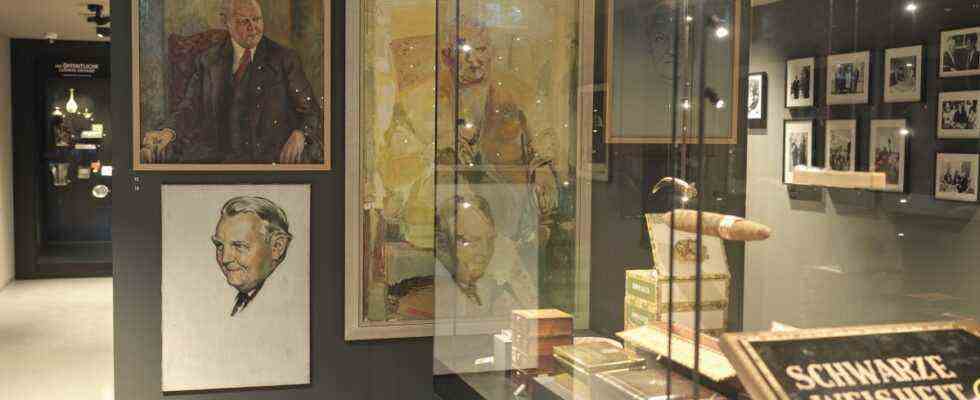The boxes were sealed when they arrived in Fürth. Seven or eight, grey, made of metal, Evi Kurz can’t remember exactly how exciting it all was. What was really in the boxes should decide whether their coup succeeds. Negotiations about the delivery had dragged on for months. At some point the money had flowed, transferred to South Africa without Kurz ever seeing the contents. Then the boxes were in front of her.
A year and a half later, at the end of January 2022, Evi Kurz is sitting in a meeting room at the Ludwig Erhard Center (LEZ). The former TV journalist is chairwoman of the house foundation and grins that the matter was “somewhat dubious”. A middlewoman only asked for two million euros, far too much and anyway the museum for Ludwig Erhard in Fürth was not even finished yet. Months passed. Then Kurz played poker. Said that the LEZ was up and running and that they were no longer really dependent on the delivery. So she wanted to push the price, supply and demand. The museum still wasn’t there.
Today, the center has long been inaugurated, directly opposite the birthplace of Ludwig Erhard, who later became Bavarian and West German Economics Minister and Federal Chancellor. Erhard lived there with his parents until he was a teenager and later went to commercial school in Nuremberg. The building is a radiantly renovated crooked house with a creaky floor, dark green window frames and a permanent exhibition on Erhard. The Federal President came to the museum inauguration in the large LEZ, in the new building opposite, in 2018, a 18 million euro prestige project by the federal government, the Free State and the LEZ Foundation, there have already been awards for the design, the house is currently nominated for the European Museum Prize.
Kurz’ mobile phone is ringing every minute these days. This Monday, when Ludwig Erhard, the “father of the economic miracle” and the social market economy, would have turned 125, they will open the new exhibition, and Erhard and the future will be discussed on a podium. Kurz still has a few things to settle, the lighting didn’t come on time, delivery problems, it’s still Corona. But the 66-year-old has no doubt that everything is up and running as it should by Monday.
Evi Kurz, Chairwoman of the Board of Directors of the Ludwig-Erhard-Haus Foundation, pulled off the coup: she brought the estate from South Africa to Fürth.
(Photo: Clara Lipkowski)
They carefully opened the boxes and unpacked the exhibits one by one. On a list that had been sent to them beforehand, they ticked off what had actually been delivered and what hadn’t. A few hats were moldy, Kurz says, as was a cutlery box, but most of it was there: personal gifts from heads of state and government from the three years of Chancellorship, a key from Tokyo, a model rocket from Florida, a Stetson. Cigars from the perennial smoker Erhard can also be seen from now on, his alleged favorite rose quartz ashtray, walking sticks from Erhard, who suffered from polio as a child, a pennant from the “Spielvereinigung Fürth” from 1954, a wood shop that his granddaughter used to work in family holiday home at Tegernsee – and so did grandfather. And there is a handwritten note: “Money is still hidden” writes Erhard, and then: “In the large dresser behind the old coffee set”. Ludwig Erhard, the proven economics expert and financial expert, distrusted the banks – of all people.
The coup had succeeded Evi Kurz. The inheritance had not been seen anywhere in public until then and now had the right place. Kurz had been researching the estate since 2011, but hastens to say that knowledgeable people helped her, the historian Daniel Koerfer from Berlin, the Munich curator Michael Henker. She probably would have just put the porcelain in the display case, but the executioner intervened, saying that it was first being polished and worked up.
Prime Minister Markus Söder, Minister of the Interior Joachim Herrmann – and great-grandchildren of Ludwig Erhard, who have not yet seen the estate items themselves, have announced that they will be at the opening. You have contributed black-and-white photographs to the exhibition in the museum’s “Treasury”. They show Erhard in private reading or with his family, some pieces can be seen in photos and then found again in the exhibition.
Now on view for the first time: the walking sticks of the former chancellor. Erhard contracted polio as a child.
(Photo: Clara Lipkowski)
Evi Kurz found out about the estate more or less by accident, through a mirror-Item 2010, when an anonymous consortium offered the estate for two million euros. 17 years earlier it had become known that the association “Ludwig-Erhard-Foundation eV” in Bonn had simply sold the estate by means of an advertisement – past all museums to a private art dealer in Cologne. There was no LEZ back then. The art dealer could hardly believe his luck. TV excerpts from that time show Ulrich Wickert in the daily topics how he moderates the “miraculous story” and then the buyer, completely aghast, says: “Well, that wasn’t normal for me, wasn’t it…?”. That’s why he reacted so quickly. A scandal back then.
The estate is now in the possession of the LEZ Foundation and is open to the public, which should help the Erhard location in Fürth to become even better known. But how did the estate get to South Africa of all places? “We would also like to know that,” says Kurz. Did Erhard have connections to South Africa? Kurz spreads his arms. “Absolutely no idea. But that would be a good next story.”

